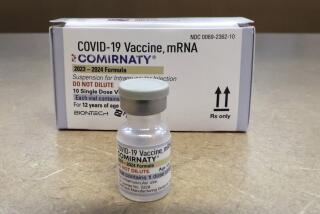Experts Press for Vaccination Coverage for All
- Share via
WASHINGTON — To ensure that all Americans get needed vaccinations, the government should require medical insurance to cover the shots and should provide vouchers to people without insurance, a panel of medical experts recommended Monday.
“It was uppermost in our minds to close the gap, to assure there was no one in this country who lacked the means to pay for vaccinations,” said panel member Sara Rosenbaum of George Washington University.
Mark Pauly of the University of Pennsylvania, another member of the committee that prepared the report, added: “We wanted to design a system where access and availability isn’t something that occurs only if you’re lucky.”
The recommendation from the Institute of Medicine urges that all private and government medical insurance cover needed vaccinations, that the government subsidize that coverage and that the government provide vouchers so people without insurance can get their shots.
“We offer a plan that both ensures access to vaccines for those in need and creates incentives for private investment in the vaccine industry that would sustain the development and manufacture of these products in the future,” said Frank Sloan, professor of health policy at Duke University, who chaired the panel that issued the report.
Walter Orenstein, director of the National Immunization Program at the national Centers for Disease Control and Prevention, said the report provided many useful suggestions his agency would consider.
Dr. Donald Young, president of the Health Insurance Assn. of America, said: “The proposal for a fully funded mandate for vaccinations is an interesting concept, worthy of further consideration. However, it seems at first blush to be a complicated approach to encouraging consumers to get the shots they need and supporting vaccine manufacturers in the development of new vaccines.”
He said he worried federal funding might dry up over time, leaving a requirement that would drive up insurance costs.
The CDC reported last week that 75% of the nation’s toddlers are vaccinated on schedule against nine diseases for which shots are required by federal law.
Coverage varies widely among states and major cities, the CDC said, with pockets of the country where far too few youngsters are up-to-date on their shots. Federal health officials urged communities to eliminate the disparities.
Currently, the federal government spends about $1 billion annually to buy about half of childhood vaccines, which are primarily distributed through the states in programs such as Medicaid and Vaccines for Children. Additional money is also spent for some adult vaccines.
A reduction in the number of companies producing vaccines, however, has helped lead to shortages in the last couple of years. The CDC has said it plans to establish a vaccine stockpile by 2006 to curtail such problems.
Offering a subsidy for the purchase and distribution of the vaccines also would provide a stable market, which would encourage manufacturers to produce them, the report said.
It noted that more than 25 companies produced vaccines for the U.S. market 30 years ago, while only five do so today.
While most health plans already cover vaccines, the report recommended changes in federal regulations to make sure that all would cover insured children, adults ages 65 and over and people with health disorders that place them at higher risk for vaccine-preventable disease.
Vouchers for uninsured people in those categories would allow them to obtain the same protection.
More to Read
Sign up for Essential California
The most important California stories and recommendations in your inbox every morning.
You may occasionally receive promotional content from the Los Angeles Times.










